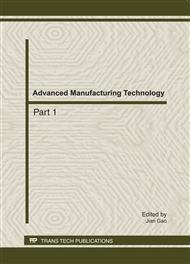[1]
K.R. Baker and G.D. Scudder: Sequencing with earliness and tardiness penalties, a review. Operation Research. Vol. 38 (1990), pp.22-36.
DOI: 10.1287/opre.38.1.22
Google Scholar
[2]
M.R. Garey, R.E. Tarjan and G.T. Wilfong: One-Processor Scheduling with Symmetric Earliness and Tardiness Penalties. Mathematics of Operations Research. Vol.13 (1988), pp.330-348.
DOI: 10.1287/moor.13.2.330
Google Scholar
[3]
Q.K. Pan, M. F. Tasgetiren and Y.C. Liang: Minimizing total earliness and tardiness penalties with a common due date on a single machine using a discrete particle swarm optimization algorithm. ANTS 2006, LNCS 4150 (2006), pp.460-467.
DOI: 10.1007/11839088_46
Google Scholar
[4]
M. Mirabi: A new meta-heuristic for scheduling of single machine problem with sequence dependent setups. Australian Journal of Basic and Applied Sciences. Vol. 4(2)(2010), pp.247-256.
Google Scholar
[5]
M. Rebai and I. Kacem: Minimizing the earliness-tardiness costs on a single machin. IEEE (2008)
DOI: 10.1109/icsssm.2008.4598495
Google Scholar
[6]
D. Biskup and M. Feldmann: Benchmark for scheduling on a single machine against restrictive and unrestrictive common due dates. Computer & Operation research. Vol. 28 (2001), pp.787-801.
DOI: 10.1016/s0305-0548(00)00008-3
Google Scholar
[7]
M. Feldmann and D. Biskup: Single-machine scheduling for minimizing earliness and tardiness penalties by meta-heuristic approaches. Computer & Industrial Engineering. Vol. 44 (2003), pp.307-323.
DOI: 10.1016/s0360-8352(02)00181-x
Google Scholar
[8]
C.M. Hino, D.P. Ronconi and A.B. Mendes: Minimizing earliness and tardiness penalties in single-machine problem with a common due date. European Journal of Operational Research. Vol. 160 (2005), pp.190-201.
DOI: 10.1016/j.ejor.2004.03.006
Google Scholar
[9]
W. Szwarc and S.K. Mukhopadhyay: Optimal Timing Schedules in Earliness-Tardiness Single Machine Sequencing. Naval Research Logistics. Vol. 42 (1995), pp.1109-1114.
DOI: 10.1002/1520-6750(199510)42:7<1109::aid-nav3220420709>3.0.co;2-5
Google Scholar
[10]
M. Pinedo: Pinedo, M. Scheduling: Theory, Algorithms and Systems (2nd edition).Prentice-Hall. Upper Saddle River. NJ (2002)
Google Scholar


